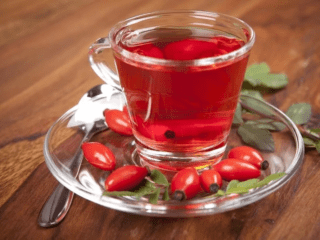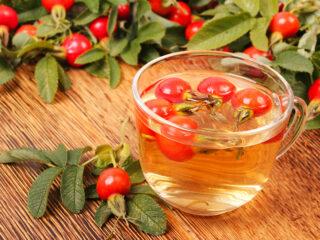Content
- 1 What does rose hip root look like?
- 2 Chemical composition
- 3 What does rosehip root help and what is beneficial for the human body?
- 4 How to properly prepare and brew rosehip root
- 5 How to use and drink rosehip root
- 5.1 Rosehip root for prostate stones
- 5.2 For hepatitis
- 5.3 Rosehip root for gallstones
- 5.4 For cystitis
- 5.5 For kidney stones
- 5.6 Rosehip root for prostatitis
- 5.7 Rosehip root to boost immunity
- 5.8 For hypertension
- 5.9 For fungal infections of the skin and nails
- 5.10 From uterine bleeding
- 5.11 For malignant tumors
- 5.12 Normalization of metabolic processes
- 5.13 Oral freshening
- 6 Application in cosmetology
- 7 Contraindications to the use of rosehip root
- 8 Conclusion
- 9 Reviews about the healing properties of rosehip root for stones
Rosehip is a popular and well-studied plant used in traditional and alternative medicine. Healing qualities are usually attributed to the fruits. However, not only the above-ground parts of the bush are used for the treatment and prevention of various diseases.The medicinal properties of rosehip root and contraindications must be taken into account when using products based on it. This will increase their effectiveness and minimize the risk of adverse reactions.
What does rose hip root look like?
The plant belongs to the Rosaceae family. Rosehip leaves, fruits and roots were actively used by Avicenna during the development of medicine. It has been proven that the medicinal properties of the culture make it possible to carry out therapy and prevention of even the most severe somatic diseases.
The plant has a developed root system. However, only small appendages are used for medicinal purposes. The main root lies at a depth of about 3 m. It has no healing properties.
Raw materials can be harvested either in late autumn or early spring before the start of the growing season. When digging, it is important not to damage the roots. To prevent the death of the rosehip, part of the tubers is removed from the right or left side.
Before use, the root appendages are washed, crushed and dried in a dark place. Raw materials can be stored in paper bags, boxes or glass containers for up to two years.
Chemical composition
The benefits of rosehip roots are due to the healing components included. Among the substances important for health present in raw materials are:
- thiamine;
- riboflavin;
- folic acid;
- pectins;
- vitamin K;
- retinol;
- magnesium;
- potassium;
- iron;
- manganese.
Root appendages are rich in tannins.
What does rosehip root help and what is beneficial for the human body?
The medicinal properties of the raw material were first described by the ancient Greek scientist Theophrastus. It has been established that the use of products made from rosehip root promotes:
- increasing immunity and physical activity;
- normalization of metabolic processes;
- improving brain function;
- vasodilation.
Aqueous solutions have varied effects. The usefulness of rose hip root is manifested in the following properties:
- anti-inflammatory;
- antibacterial;
- choleretic;
- astringent;
- antidiabetic.
It is advisable to use dosage forms based on rosehip root appendages for the following pathologies:
- digestive disorders, diarrhea;
- inflammation of the urinary tract;
- joint diseases, for example, bursitis, rheumatism, polyarthritis;
- gout;
- hypertension;
- uterine bleeding;
- eczema, psoriasis, dermatitis.
Decoctions and infusions of rosehip root are prescribed for poisoning. Aqueous solutions help remove toxic substances from the body and restore water-salt balance.
The healing properties of rosehip root for stones
The pathology is caused by metabolic disorders and poor diet. The use of wild rose rhizomes is indicated for kidney and gallstones. This is due to the effect of healing compounds on formations. Therapeutic courses contribute to the gradual dissolution of stones and the elimination of pain.

Rosehip roots help only with small calcifications
What is useful for men
It is known that the risk of developing heart and vascular diseases in men is higher than in women. Products made from rosehip root have a gentle effect on the circulatory system. Their regular use strengthens the vascular wall.Prevention of gout, which more often affects men, is essential. The use of medicinal infusions and tinctures increases performance.
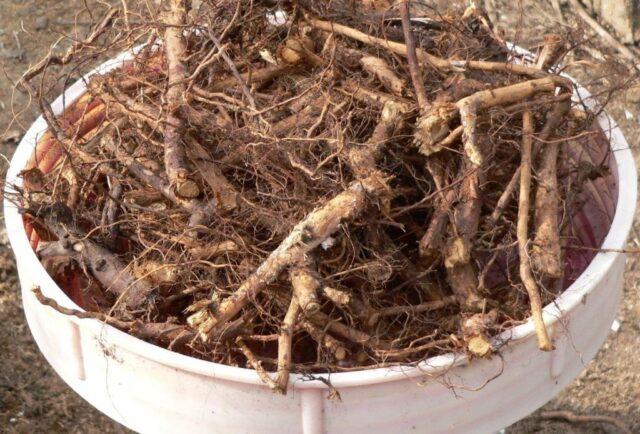
Rosehip root has a positive effect on the reproductive system
What is useful for women
Rosehip root is recommended in the presence of gynecological pathologies. These include:
- uterine bleeding;
- inflammatory processes of the organs of the reproductive system.
Products made from medicinal raw materials help improve immunity. This is essential during pregnancy and during menopause.

External use of decoctions and infusions allows you to solve a number of cosmetic problems associated with the condition of the skin and hair
Benefits for children
Rosehip root is called a storehouse of useful substances. The valuable components included in the raw materials contribute to the harmonious development of the child’s body.
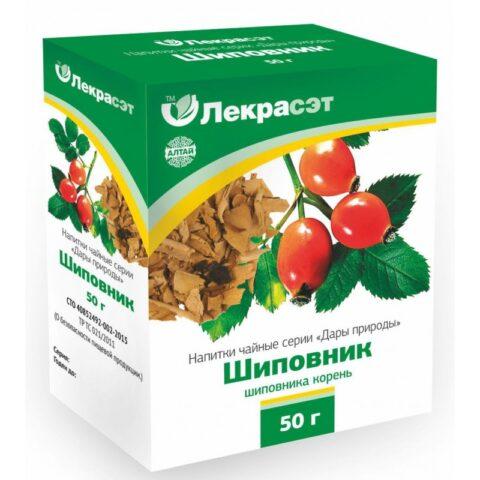
Including a drink from root appendages in the diet helps improve immunity, which is especially important in the autumn-spring period
How to properly prepare and brew rosehip root
The raw materials are used for the preparation of aqueous and alcohol solutions. The drug is highly effective.
How to prepare a decoction of rosehip root
The product has an anti-inflammatory effect. This is due to the significant concentration of valuable substances in the composition.
The decoction includes the following ingredients:
- 1 dried wild rose root;
- 500 ml water.
The procedure for preparing the drug is quite simple:
- The root is cut into small pieces.
- The raw materials are poured with cold water.
- The mixture is simmered after boiling for ten minutes.
- The resulting broth is poured into a thermos to infuse for 15 minutes.
- The drink is cooled and filtered before drinking.

A decoction of rosehip roots is prescribed to treat inflammatory processes.
Tea
The drink helps with decreased immunity. It can be used to prevent vitamin deficiencies.
To prepare tea you will need the following ingredients:
- 1 tsp. raw materials;
- 1 tbsp. boiling water
The drink is made as follows:
- Rosehip roots are ground in a blender.
- The resulting powder is placed in a cup and poured with boiling water.
- The tea is steeped for ten minutes before drinking.
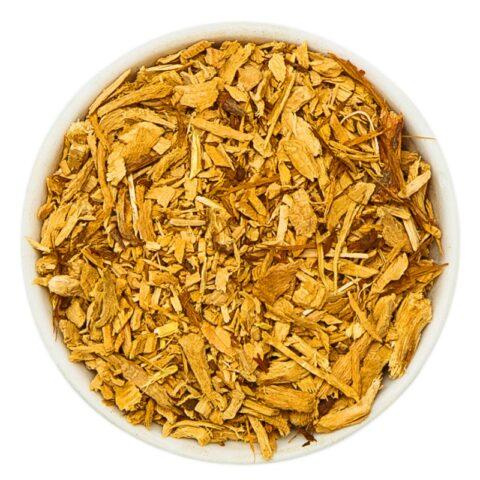
Rosehip root tea saturates the weakened body with essential vitamins and valuable substances
Infusion
There are several options for making a healthy drink. The choice of a specific formulation depends on the indications for use.
To prepare the infusion use:
- 1 tsp. raw materials;
- 1 tbsp. boiling water
To make the drink, follow the instructions:
- The raw materials are crushed using a knife or coffee grinder.
- The rhizomes are poured with the required amount of boiling water.
- The product is infused for three hours.

An infusion of wild rose rhizomes can be prepared in a thermos
Tincture
Valuable substances have good solubility in alcohol. To make a useful product, use the following components:
- crushed wild rose rhizomes - 50 g;
- citrus zest - 10 g;
- ground coffee - 1 pinch;
- vodka - 50 ml;
- sugar syrup - 1 tbsp. l.
Instructions for preparing rosehip root tincture include the following steps:
- The raw materials are mixed in glass containers.
- The composition is filled with an alcohol solution.
- The mixture is shaken.
- The container is removed for two weeks in a dark and dry place.
- After the specified time, the product is filtered and sugar syrup is added.
- The liquid is poured into a bottle to infuse for three days.
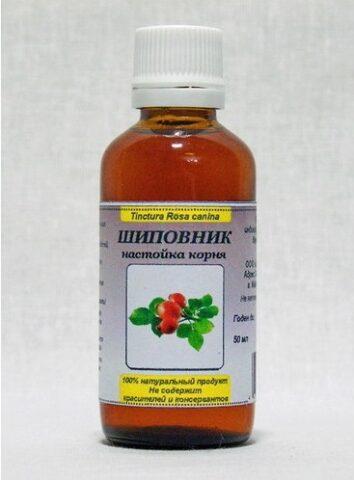
Drink wild rose root tincture 15 ml per day
Baths
Decoctions can be added to water to fill baths. The product includes:
- chopped root - 6 tbsp. l.;
- boiling water - 3 l.
The decoction is prepared as follows:
- The raw materials are poured with boiling water.
- The composition is simmered over low heat for three hours.
- The product is infused for an hour and filtered.
- The drug is poured into bath water.
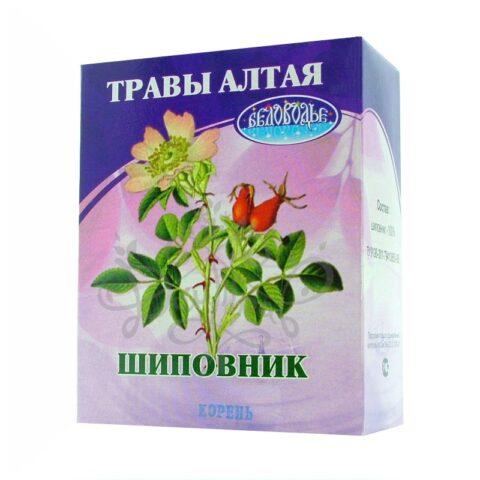
A decoction of rosehip roots is used for taking medicinal baths for skin diseases.
Compresses
Decoctions, infusions and tinctures are also intended for external use. Dosage forms have anti-inflammatory properties, which are used to treat diseases of the joints and skin.
To prepare an external remedy, take:
- crushed raw materials - 2 tbsp. l.;
- boiling water - 1 l.
Step-by-step instructions include the following steps:
- The roots of a wild rose are poured into an enamel pan and poured with boiling water.
- The product is simmered over low heat for three hours.
- The composition is infused for an hour and then filtered.
- The bandage is soaked in the resulting decoction and applied to the sore spot.
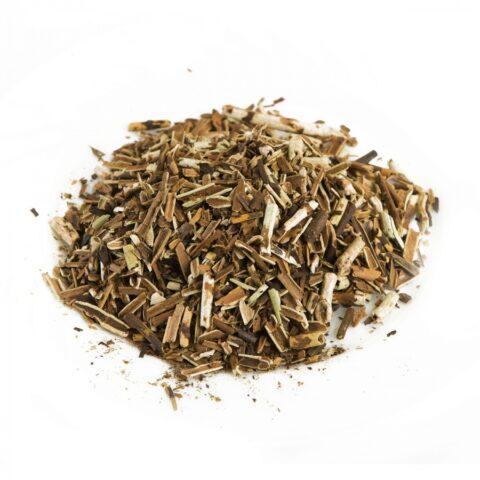
Compresses with wild rose root appendages are advisable to use for gout, arthritis and arthrosis.
How to use and drink rosehip root
In folk medicine, there are many options for using medicinal raw materials. Aqueous solutions are intended for both internal and external use.
Rosehip root for prostate stones
An advanced inflammatory process of the prostate gland is dangerous due to the formation of solid salt deposits. Stones in the prostate cause severe pain.
In the initial stages, you can use a decoction of rosehip roots, which helps get rid of prostate calcifications. To prepare it you need to take:
- crushed raw materials - 2 tbsp. l.;
- hot water - 400 ml.
The decoction is made as follows:
- The rhizomes are filled with water.
- The composition is simmered in a water bath for five minutes.
- The product is cooled and filtered.
The drug is drunk on an empty stomach, 70 ml once a day.
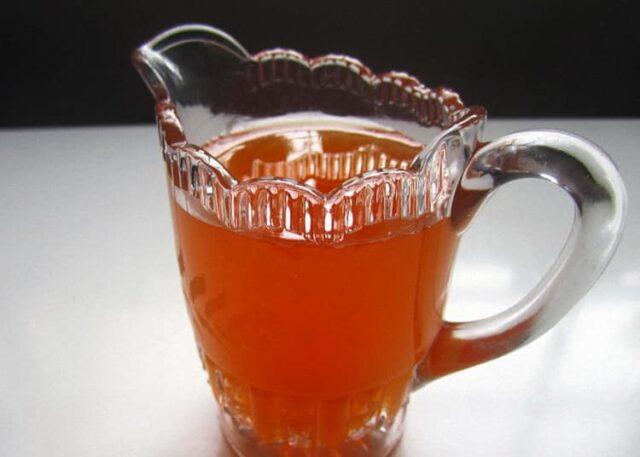
A decoction of rosehip roots is consumed after consultation with a doctor.
For hepatitis
Root appendages are used to treat diseases of both a viral nature and a chronic course. To prepare a useful product you need to take:
- 250 ml boiling water;
- 2-3 tsp. raw materials.
To make a decoction, you must follow the instructions:
- Dry rosehip roots are poured with boiling water.
- The composition is simmered over low heat for 15 minutes.
- The drink is infused for half an hour.
The decoction should be drunk twice daily:
- in the morning on an empty stomach;
- at one o'clock in the morning.
The therapeutic course is two months. Then you should take a break for 30 days.

Rosehip roots help eliminate the harmful effects of antibacterial agents and remove toxins from the body
Rosehip root for gallstones
Pathology requires diet. To relieve the condition and eliminate stones, you can use a recipe for a decoction of rosehip root. To make a healing remedy, take:
- water - 1 l;
- raw materials - 120 g.
The cooking process includes the following steps:
- The root appendages are filled with water.
- The mixture is brought to a boil and simmered over low heat for another 20 minutes.
- The product is infused for eight hours.
Before use, the decoction must be strained. It is taken three times a day before meals. The dosage is 40 ml.
The course of treatment for gallstones lasts up to four weeks
For cystitis
Inflammation of the bladder is accompanied by pain in the lower abdomen and the presence of a feeling of incomplete emptying. To eliminate signs of cystitis, it is preferable to use rosehip root appendages rather than fruits.
To make a decoction, you need to take the following components:
- water - 500 ml;
- raw materials - 4 tbsp. l.
The procedure for preparing the drug is simple:
- The crushed rosehip roots are poured with water.
- The composition is simmered in a water bath for 20 minutes.
- The broth is cooled and filtered.
The drink is consumed three times a day. It is taken before meals.
A decoction of rosehip roots helps cleanse the bladder of pathogenic microorganisms.
For kidney stones
The paired organ is adversely affected by disruptions in metabolic processes and poor nutrition. Lack of physical activity and excessive salt consumption lead to the formation of kidney stones.
To normalize the functioning of the urinary system, it is recommended to drink a decoction containing the root appendages of rose hips. To prepare it take:
- 1 tbsp. boiling water;
- 2 tbsp. l. raw materials.
To make a decoction, follow the following algorithm:
- Rosehip roots are crushed in a blender or coffee grinder.
- The raw materials are poured with water and simmered for a quarter of an hour over low heat.
- The product is filtered after it has cooled.
The decoction is drunk three times a day warm.The drink helps dissolve stones.

Both fresh and dry rosehip roots are suitable for eliminating kidney stones.
Treatment should be carried out under the supervision of a doctor, who recommends the required dosage of the beneficial drug. The therapeutic course can last a month or more
Rosehip root for prostatitis
Drinks based on raw materials perfectly relieve the inflammatory process in the early stages. The healing agent includes the following components:
- 3 tbsp. l. dry and crushed rosehip roots;
- 300 ml warm water.
The decoction is prepared as follows:
- The raw material must be filled with water.
- The composition is simmered over low heat for five minutes.
- The liquid is cooled and filtered before use.
The drug is drunk 70 ml on an empty stomach before meals.
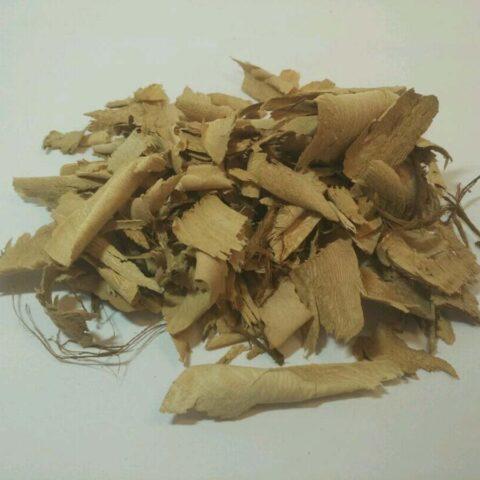
The therapeutic course is six months
Rosehip root to boost immunity
A medicinal decoction is often recommended for the treatment and prevention of seasonal vitamin deficiencies. To prepare it use:
- boiling water - 400 ml;
- root appendages - 40 g.
Preparation of the decoction includes the following steps:
- The roots are poured with boiling water.
- The mixture is placed in a water bath.
- The product is simmered for 15 minutes over low heat.
- The prepared broth is removed from the stove, wrapped in a towel and left for five hours.
Before use, strain the decoction. The drug is taken four times a day. The dosage is 100 ml.
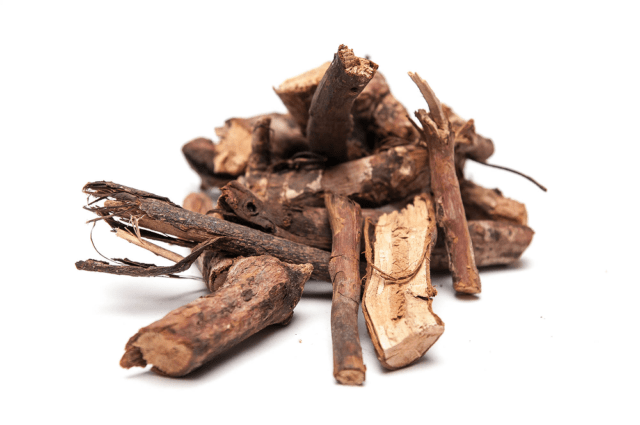
The course of therapy with rosehip root decoction is two weeks.
For hypertension
High blood pressure is a common pathology. The root appendages of rose hips are distinguished by their hypotensive properties.
A decoction to eliminate hypotension includes:
- 500 ml water;
- 1 tbsp. l. chopped roots.
The product is prepared as follows:
- The raw materials should be filled with water.
- The mixture is boiled for five minutes.
- The decoction is infused for three hours.
The drink is intended to be consumed warm. The resulting decoction is divided into three parts and drunk throughout the day.

To normalize blood pressure, it is advisable to prepare a decoction of fresh rosehip roots.
For fungal infections of the skin and nails
To eliminate pathology, use an infusion. To make it, take the following components:
- water - 300 ml;
- dried rosehip roots - 20 g.
Preparation of the infusion includes the following steps:
- The raw material must be filled with water.
- The mixture is boiled for 20 minutes over low heat.
- The drink is infused for eight hours.
- Before use, filter the product.
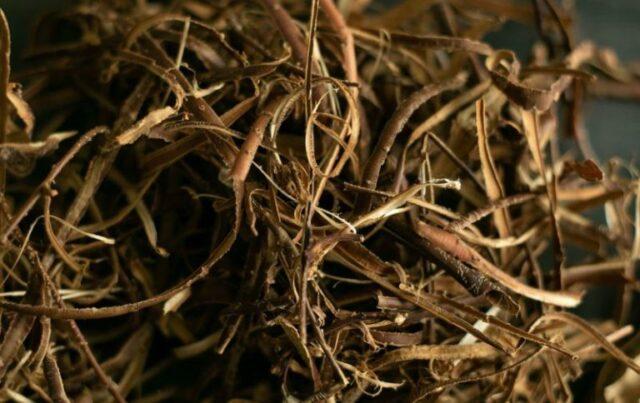
Drink 50 ml of rosehip root infusion a quarter of an hour before meals.
From uterine bleeding
For dysfunction of the reproductive system, you can use a popular recipe. It includes the following ingredients:
- water - 2 tbsp.;
- root appendages - 2 tbsp. l.
The process of preparing the decoction is simple and accessible:
- The roots of the wild rose should be filled with water.
- The composition is boiled for 15 minutes.
- The container with the drug is wrapped in a blanket and infused for three hours.
- Before use, the product is filtered.
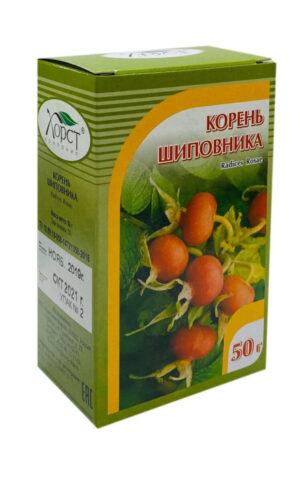
To eliminate uterine bleeding, drink a decoction of rosehip roots three times a day.
For malignant tumors
Wild rose prevents the division of cancer cells. Root appendages can be used as part of complex therapy for oncological pathologies.
To prepare a useful drug, take:
- boiling water - 1 l;
- crushed roots - 40 g.
The infusion is made like this:
- The thermos is filled with raw materials and filled with boiled water.
- The product can be consumed after straining after three hours during the day in small portions.

The advantage of using products based on wild rose roots is the absence of side effects
Normalization of metabolic processes
A decoction of rosehip root appendages promotes weight correction due to improved metabolism. The product is prepared using the following components:
- water - 0.5 l;
- wild rose rhizomes - 2 tbsp. l.
To make a decoction, you need to focus on the following steps:
- The raw materials are filled with the required amount of water.
- The composition is brought to a boil.
- The product is simmered over low heat for 15 minutes.
- The drug is infused for two hours and filtered.
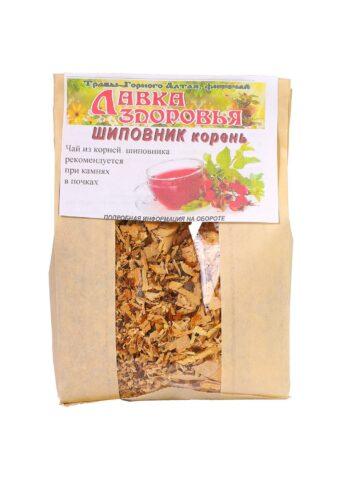
Drink a decoction of wild rose roots three times a day before meals.
Oral freshening
Rosehip rhizomes have anti-inflammatory and antibacterial effects. Rinsing the mouth with an infusion of wild rose raw materials helps eliminate unpleasant odor and inflammation of the gums caused by pathogenic microorganisms.
The product includes:
- root appendages in powder form - 1 tsp;
- warm boiled water – 1 tbsp.
The drug is prepared as follows:
- The crushed roots are filled with water.
- The product is left overnight.
- In the morning, the composition is filtered and used for rinsing.
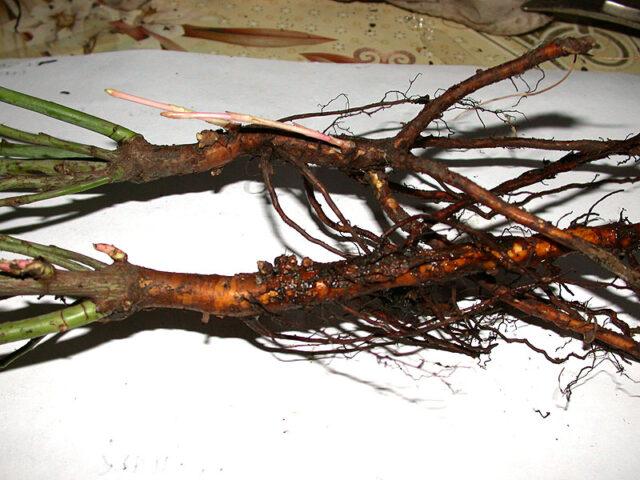
Using an infusion of wild rose rhizomes helps disinfect the oral cavity.
Application in cosmetology
Decoctions are actively used to preserve the beauty and youth of skin and hair. Products made from rosehip roots are suitable for rinsing curls after washing. They give the strands softness and silkiness.
The infusion and tincture can be used as a refreshing tonic. Such compositions help eliminate acne due to their anti-inflammatory and antibacterial effect. Good results can be expected from using cosmetic ice. You can add linden flowers, essential oils of chamomile and rosemary to the decoction of rosehip roots.
Contraindications to the use of rosehip root
Any medicine can be harmful if used incorrectly. Rosehip root is no exception. Decoctions and infusions based on medicinal raw materials should be consumed internally and applied externally only after consultation with a specialist. When preparing aqueous solutions, it is important to strictly adhere to the recommended proportions.
Drinks from rosehip root appendages are taken with caution in case of heart and vascular diseases. It is contraindicated to abuse water infusions based on medicinal raw materials. Rosehip roots are rich in tannins, which can cause stool upset.
Infusions and decoctions are prohibited for use in acute diseases of the genitourinary system. Contraindications also include:
- allergies and individual intolerance reactions;
- disturbance in blood coagulation;
- hypotension.
Conclusion
The medicinal properties of rosehip root and contraindications should be carefully studied before preparing and using products based on it. Natural raw materials have anti-inflammatory, diuretic, analgesic, and antibacterial properties.Root appendages of wild roses help with gynecological and urological diseases, skin and joint diseases.
Reviews about the healing properties of rosehip root for stones
The benefits of healing raw materials have been proven by scientific research. Reviews contain information about the effectiveness of using rosehip root for various diseases.




